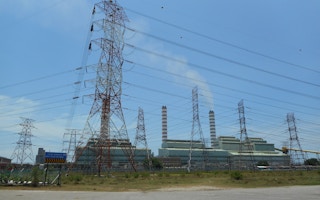Malaysia’s largest electricity provider Tenaga Nasional Berhad, or TNB, has said it will retire some of its coal plants earlier than planned, as part of its sustainability agenda.
The state-owned utility said it will start by closing a 1,400 megawatt (MW) coal plant in Selangor state, originally slated to retire in 2029, up to a year ahead of schedule. The plan is still pending nods from shareholders and the government.
“TNB is very much in the driver’s seat when it comes to delivering the nation’s energy transition,” said TNB president and chief executive officer Datuk Baharin Din.
TNB has plans to reduce its emissions intensity by 35 per cent and halve its coal generation capacity by 2035. The utility also wants to reach net-zero emissions by 2050.
Ghee Peh, an analyst at United States-based thinktank Institute for Energy Economics and Financial Analysis, said TNB’s announcement was significant as the plant slated for early closure can be considered a large power station for the Malaysian market.
“Malaysia historically has had no issues sourcing coal from Indonesia and even Australia. For the government to commit to closing this coal plant shows determination and also some planning to replace the power from this plant with renewable energy,” Peh added.
TNB did not say how many coal plants in total it plans to close early. Malaysia currently has eight coal plants which can produce 12,000 MW of electricity. Last year, the country announced plans to cut over 4,000 MW of coal power capacity by 2039. Coal is the dominant fuel in Malaysia’s energy mix, producing 43 per cent of the country’s power in 2019.
TNB supplies electricity across peninsular Malaysia, and has a majority stake in Sabah state’s utility firm, Sabah Electricity, on Borneo island. It also has investments in coal power infrastructure in India, and is part of plans for a new coal plant in Kalimantan, Indonesia.
Coal is the most pollutive form of fossil fuels in the world. There are plans to retire coal plants early in countries like Australia and Germany. Multilateral groups such as the Climate Investment Funds and Asian Development Bank are also trying to fund the early closure of coal plants in developing countries.
However, coal has seen a resurgence amid high energy demand after Covid-19 lockdowns in the past two years, as well as reduced energy supply due to the Russia-Ukraine conflict. The use of coal almost reached a new high last year, the same year countries pledged to start moving away from it at climate conference COP26.
Renewable energy, electric cars
TNB said that the clean energy market in Malaysia could grow to RM80 billion (US$18 billion), and that it plans to capture about RM40 billion (US$9 billion) of the revenue by 2050.
The utility said it will expand the development of solar, wind and energy storage infrastructure across Asia Pacific and Europe. It is aiming to install 14 gigawatts (GW) of renewable energy capacity by 2050, up from about 3.5 GW today. It also wants to start fuelling a 1,400 MW gas plant in Malaysia with hydrogen by 2029.
TNB announced it will invest RM90 million (US$20.2 million) in electric vehicles over three years, to capture a RM1.3 billion (US$0.3 billion) slice of the market by 2030.
“The potential positive impact to both climate and the company’s bottom-line makes the development of the EV ecosystem a clear priority for TNB,” said Baharin.










